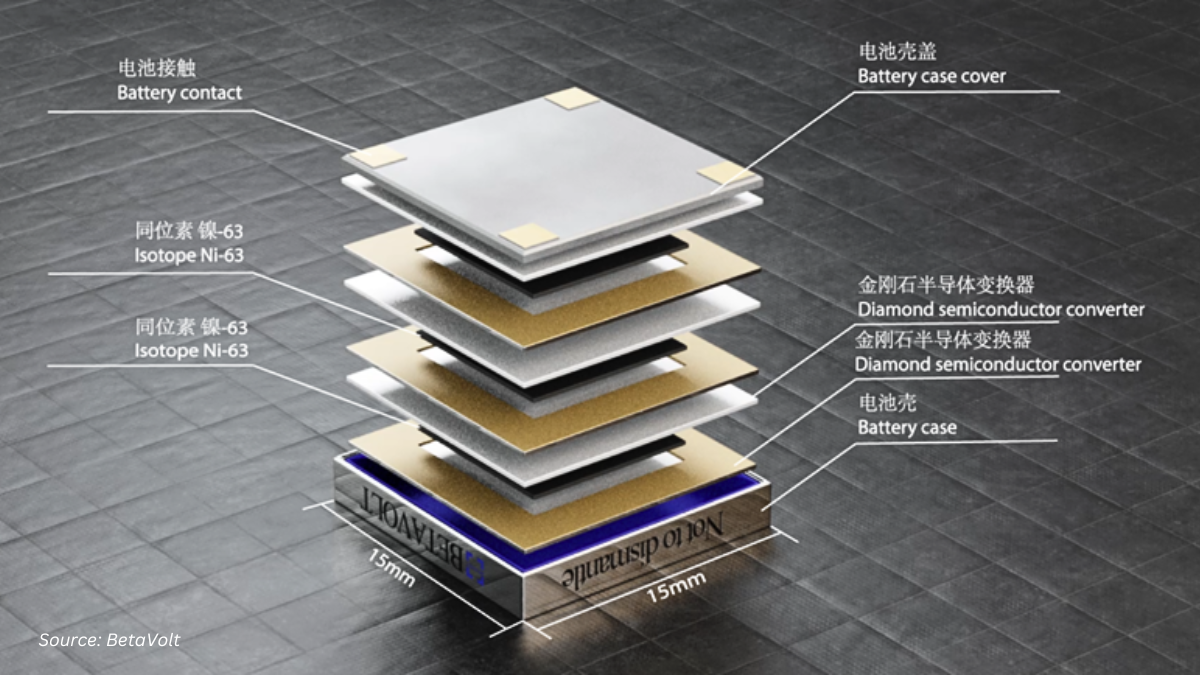Redefining Energy Storage - Are Nuclear Batteries the Future?
Explore the transformative journey of battery technology in our latest article. From the evolution of lithium-ion batteries to nuclear batteries, check up on the advancements shaping industries like renewable energy storage, e-mobility, consumer electronics, and telecommunications.

By: Shivani Rani, Shikha Saxena, Anurag Bajpai
The Importance of Batteries and the Ongoing Revolution in Battery Technology
Batteries play a crucial role in our daily lives, powering various devices from smartphones and laptops to electric vehicles and grid storage systems. The increasing demand for portable electronic devices and the transition to electric mobility have driven significant advancements in battery technology. The industry's focus on sustainability has led to the development of eco-friendly and long-lasting batteries, aiming to reduce environmental impact and support the deployment of renewable energy sources.
The ongoing revolution in battery technology is characterized by a shift towards sustainable and high-performance energy storage solutions. Traditional lithium-ion batteries, while prevalent, have limitations in terms of energy density, lifespan, and environmental impact. As a result, researchers and companies are exploring alternative designs such as solid-state and sodium-based batteries, which promise higher energy densities, longer lifespans, and reduced environmental footprint.

Betavolt BV100 Nuclear Battery: A Game-Changer in Energy Storage
The Betavolt BV100 nuclear battery developed by Betavolt New Energy Technology represents a groundbreaking innovation in energy storage. This nuclear energy battery utilizes nickel-63 isotopes and fourth-generation diamond semiconductors to deliver long-lasting and eco-friendly power solutions. With key attributes such as its compact size, high power output, extended lifetime, and resistance to extreme temperatures, the Betavolt BV100 is poised to revolutionize various industries.
The compact size of the Betavolt BV100, smaller than a coin at just 15×15×5 mm, makes it suitable for integration into a wide range of applications, from consumer electronics to aerospace systems. Its ability to deliver 100 microwatts of power with a voltage of 3 V without the need for recharging for up to 50 years makes it an attractive option for long-term power requirements.

Source: BetaVolt
Furthermore, the modular design of the Betavolt BV100, composed of multiple independent unit modules, allows for flexible configurations to meet diverse application needs. This versatility makes it suitable for use in aerospace, robotics, medical devices, and other markets. The battery's expected safety, stability, and resistance to extreme temperatures further enhance its appeal for use in demanding environments.
Environmental Impact of Batteries
The environmental impact of batteries has been a subject of concern, particularly with the widespread adoption of electric vehicles and renewable energy storage systems. While batteries are vital for enabling the full deployment of renewables and supporting a stable and sustainable energy supply, their production and disposal can have significant environmental consequences.
For instance, the production of lithium-ion batteries, which are commonly used in electric vehicles and consumer electronics, is associated with a substantial carbon footprint. The extraction of materials such as lithium and the energy-intensive manufacturing processes contribute to greenhouse gas emissions. Additionally, the disposal of batteries, if not properly managed, can lead to soil and water pollution.
Despite these challenges, the development of sustainable alternatives such as the Betavolt BV100 nuclear battery represents a significant step towards minimizing the environmental impact of energy storage solutions. By utilizing eco-friendly materials, reducing waste, and offering long-term reliability, innovative batteries like the Betavolt BV100 have the potential to play a key role in advancing a cleaner and more sustainable energy landscape.

Global Battery Market: Growth and Key Players
The global battery market is experiencing rapid growth, driven by increasing demand for consumer electronics, electric vehicles (EVs), and grid storage solutions. According to a report by Grand View Research, the global battery market is expected to grow at a compounded annual growth rate (CAGR) of 15.8% from 2023 to 2030, reaching a projected value of USD 329.84 billion by 2030.
Asia Pacific has dominated the battery market with the highest share of 55.67% in 2022, reflecting the region's strong position in battery production and consumption. The growing demand for EVs and grid storage solutions has been a key factor driving market growth. Key players in the global battery market include companies such as Panasonic Corporation, LG Chem, Samsung SDI Co., Ltd., and BYD Company Ltd., among others.
The increasing popularity of electric vehicles and the transition towards renewable energy sources have contributed to significant advancements in battery technology. As countries worldwide set ambitious targets for reducing greenhouse gas emissions and promoting clean energy solutions, innovative batteries like the Betavolt BV100 are poised to play a pivotal role in shaping the future of energy storage.
The Role of Batteries in Various Sectors
Batteries are indispensable across a multitude of sectors, each relying heavily on battery technology to power a diverse array of devices and systems. In consumer electronics, batteries enable the seamless functioning of smartphones, laptops, tablets, and wearable gadgets, ensuring constant connectivity and productivity for users.
The automotive industry has witnessed a transformative shift towards electric mobility, with batteries powering electric vehicles (EVs), hybrid vehicles, and auxiliary systems. Renewable energy storage relies on batteries to store excess energy generated from renewable sources such as solar and wind, facilitating grid stability and enabling the integration of renewable energy into the power grid.
Furthermore, telecommunications infrastructure, including mobile phone towers, data centers, and emergency communication systems, relies on batteries for backup power, ensuring uninterrupted connectivity and essential services during outages. Across these sectors and many more, batteries serve as the backbone of technological innovation, driving societal advancement and contributing to a more sustainable future.

While Betavolt plans to introduce a 1-watt version of the BV100 by 2025, advancements are needed to overcome existing limitations and enhance the battery's performance to meet evolving energy storage needs. Continued research and development efforts are essential to address the challenges and maximize the potential benefits of nuclear batteries.
In conclusion, while the Betavolt BV100 nuclear battery offers impressive longevity and environmental benefits, it faces challenges related to low power output, energy conversion efficiency, and technological constraints that need to be addressed for broader adoption across different sectors. Efforts to improve these aspects will be crucial in realizing the full potential of betavoltaic technology in powering a wide range of devices sustainably and efficiently.




